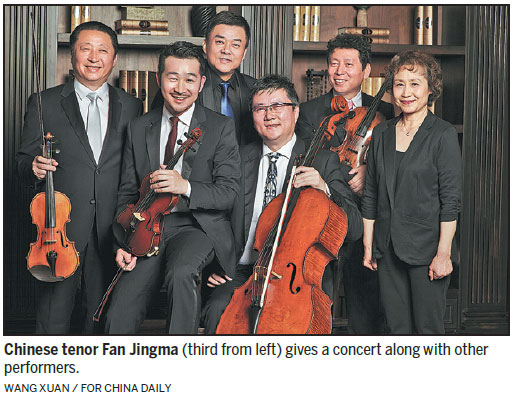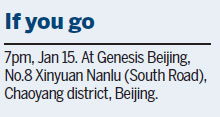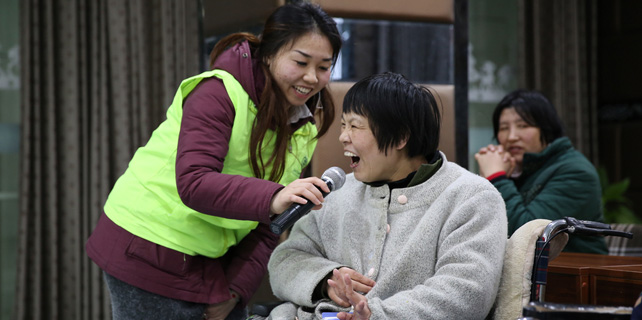Creating a Chinese musical message for a global audience
Chinese tenor Fan Jingma stops mid-sentence because something is bothering him. "It's too loud. I cannot concentrate and think," he says of the background music being played in the lobby of a high-rise building located in downtown Beijing.
"We have so much distraction in our daily lives," Fan says after moving to a quieter place. "We receive many messages every day, but how many of them are healthy and useful for our ears and eyes?"
Fan is in the building, where he is to give a concert along with other performers on Sunday, including China Philharmonic's musicians, cellist Guan Zhengyue, pianist Chen Min and violinist Chen Yun.
"I hope the audience will listen to the music quietly. The concert is unplugged without dazzling stage sets and musicians won't wear heavy makeup. It's all about music," says Fan.

The concert is part of Fan's project, yage, which he initiated in 2008. Yage which means "elegant song", combines bel canto technique, lieder style, and Chinese poetry.
One of the top tenors in China, Fan, 58, came to international attention by winning the prestigious Cardiff Singer of the World Competition in Britain in 1987, and the first prize at the Opera Index Vocal Competition in 1991 in New York.
In 1988, he left China to pursue his bel canto studies under Italian opera singer Carlo Bergonzi, and he then moved to New York to study with Franco Corelli.
Over the decades, he has performed at major opera houses around the world and his operatic repertoire includes title roles in Faust, Don Carlos, Tosca, La Traviata and The Magic Flute.
The idea of introducing yage to audiences came from Fan's long career of performing in Western opera houses.
"I traveled almost the entire world. During this period and in all the places I went, I saw that Western vocal music (not the symphonies and other instrumental works) of Mozart, Beethoven, Schumann, Schubert, Mahler, Faur��, Berlioz, Tchaikovsky, Rachmaninoff, and, of course, all those Italian bel canto art songs and folk songs, sung around the world and appreciated by every culture. But Chinese music, on the other hand, was enjoyed only within China and by ourselves. Why? This bothered me and occupied my thoughts," he says.
He also says that his project came from his attachment to Chinese poetry and music.
Fan, who was born in Southwest China's Sichuan province, was heavily influenced by his history professor parents, who are both music lovers.
Brought up in an artistic atmosphere, he learned violin as a child and his talent for singing was discovered by Lan Youqing, a teacher at the Sichuan Conservatory of Music, who later became his first vocal instructor.
"My parents read Chinese poetry and listened to music when I was young. But now, few people do that. We forget our valuable arts, which are unique," says Fan, who graduated from the Sichuan Conservatory of Music in 1982 and later furthered his studies at the Central Conservatory of Music for a year, where he was trained by Shen Xiang, a renowned vocal professor at the conservatory.
Meanwhile, over the years, Fan conducted research on music pieces based on the works of Chinese scholars, writers and poets of the 1920s and 1930s, such as Hu Shi and Liu Bannong.
In 2008, he released an album titled Chinese Lieder, a collection of Chinese art songs and folk songs, which forms part of his yage project.
The album has works such as My Sentiments to the Yangtze River, which has lyrics by Li Zhiyi from the Song Dynasty (1127-1279); a Yunnan folk song, The Running Stream, and How Can I Not Miss Her, which has lyrics by Liu Bannong.
Fan also collaborated with Chinese composer Zou Ye and history scholar Liu Xuefeng from Peking University for his project.
Before Fan brought his yage concerts to China, he presented the music genre abroad - at Yale University, Carnegie Hall and Musikverein.
The feedback from Western audiences was good because the audiences were familiar with the instruments and the singing style.

"Usually, Western audiences say 'it's very interesting' after watching a Chinese music performance, but they don't accept it. What I want to do with yage is to get them involved with our music," says Fan.
Separately, Fan has also teamed up with Renmin University and the East China Normal University to do research and promote yage.
As for the future of his project, Fan says he is pleased that more people, especially young musicians, are now willing to join him.
"This project offers a platform to young Chinese musicians. It's not just about going back to our own culture but also delivering messages, which represent China, to the world," says Fan.
(China Daily 01/14/2017 page18)
















